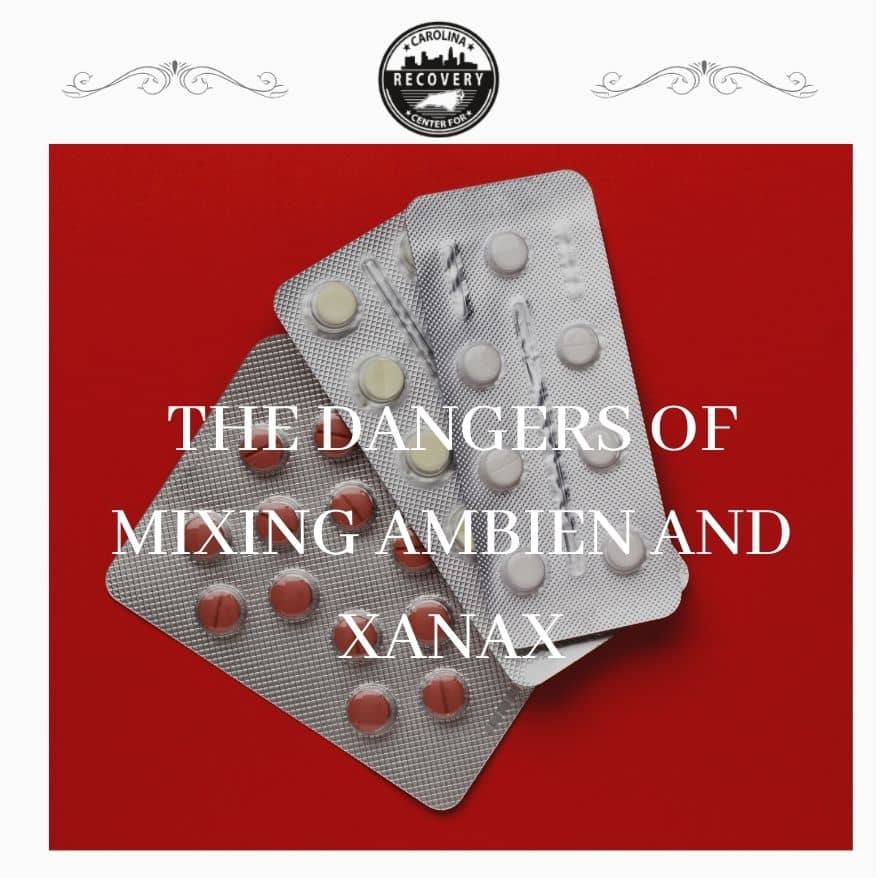Dangers of Mixing Ambien and Xanax

Medically Verified: 2/1/24
Medical Reviewer
Chief Editor

All of the information on this page has been reviewed and verified by a certified addiction professional.
Xanax and Ambien are both central nervous system (CNS) depressants and are classified as schedule IV drugs. This means that these medications are considered to have a low potential for abuse when compared to other substances like cocaine or heroin. However, many individuals have struggled with addiction to both substances.
Unfortunately, some people mix Ambien and Xanax to create a more potent effect. This is extremely dangerous, as combining two CNS depressants often causes an increased risk of addiction and additional life-threatening effects.
According to the Drug Abuse Warning Network, 50% of individuals who require emergency treatment for Ambien misuse also had substances like Xanax in their system.[1]
What is Ambien?
Ambien is a brand-name medication that contains the substance zolpidem. This drug is prescribed to treat adults who suffer from insomnia and other related sleep disorders. While this medication is effective in treating the symptoms of insomnia, it is only intended for short-term use.[2]
Individuals who have been prescribed this medication on a long-term basis are at an increased risk of developing tolerance, dependency, and addiction. Because of the drug’s habit-forming qualities, it has a reputation on the streets.
Street names for Ambien include:
- No-Gos
- Zombie Pills
- Sleepeasy
- Tic-Tacs
- A-Minus
Because of the way that Ambien interacts with the GABA neurotransmitters in the brain, it can cause euphoric and hallucinogenic effects. This is why individuals begin to abuse the drug and eventually develop an addiction. Unfortunately, many individuals who abuse this medication begin mixing it with other drugs like Xanax to increase its effects.
The Long-Term Risks of Ambien Abuse
Individuals who take large amounts of or abuse Ambien for a long period may experience the following effects:
- Difficulties with digestion
- Persistent fatigue
- Recurrent headaches
- Dry mouth
- Muscle pain and lack of muscle control
- Dizziness or drowsiness
- Depression and suicidal ideation
- Hallucinations
- Nightmares and sleepwalking
- Anxiety
- Confusion
- Withdrawal symptoms between doses
- Familial problems and financial issues
- Addiction
- Polysubstance abuse and overdose
What is Xanax?
Xanax (alprazolam) is a benzodiazepine that is used to treat anxiety disorders and seizure conditions like epilepsy. Like Ambien, this medication affects the GABA neurotransmitters to slow down the central nervous system and produce a calming effect.[3]
The calming and euphoric effects associated with often cause individuals to develop an addiction to the drug. Because of this, physicians do not recommend taking this medication on a long-term basis. However, this drug is often sold on the street because of its reputation for producing an intense and euphoric high.
Street names for Xanax include:
- School buses
- Bars
- Z-Bars
- White girls/boys
- Peaches
- Footballs
Individuals who abuse Xanax are at risk of partaking in polysubstance abuse. In other words, it is common for drug users to begin to create a more intense high. This is extremely dangerous and could potentially lead to a life-threatening overdose.
The Long-Term Risks of Xanax Abuse
Those who take Xanax on a long-term basis or use large amounts of the drug may experience:
- Reduced physical coordination
- Slowed and labored breathing
- Heart palpitations
- Stuffy nose
- Blurry vision
- Stomach issues
- Irritability and mood swings
- Sleep disturbances
- Concentration issues
- Memory loss
- Dependence, tolerance, and addiction
- Symptoms of withdrawal between doses
- Polysubstance abuse and overdose
- Heart damage and arrhythmia
- Impaired lung functioning leading to hypoxia
- Edema in extremities
What are the Dangers of Mixing Ambien and Xanax?
Ambien and Xanax are both central nervous system depressants and known drugs of abuse and it is never recommended for these two substances to be combined.
When an individual takes two CNS depressants, they run the risk of experiencing a lack of oxygen in their brain. This is known as hypoxia, a dangerous symptom of CNS depressant overdose.
Additionally, because these medications both affect the GABA neurotransmitter, combining them can lead to extremely low blood pressure and other symptoms of slowed brain activity. In other words, combining Xanax and Ambien is extremely dangerous and often leads to overdose.
The dangers of mixing these two substances include:
- Increased risk of addiction
- Severe drowsiness and loss of consciousness
- Depressed respiratory system
- Lack of oxygen in the brain (hypoxia)
- Coma
- Death
People who mix these substances should seek professional help immediately. If someone is displaying the signs of an Ambien and Xanax overdose, emergency medical intervention is necessary.
Finding Help for Ambien and Xanax Addiction
Drug addiction is a serious condition that requires professional substance abuse treatment. If you or a loved one abuses prescription drugs like alprazolam or zolpidem, you should attend a residential addiction treatment program that includes medical detox services.
Thankfully, programs like Carolina Recovery Center can help you or your loved one recover from the disease of addiction. With our comprehensive and individualized treatment programs, we promise to provide you with treatment that addresses all of your needs. Contact us today for more information about our substance abuse treatment programs.
References:

